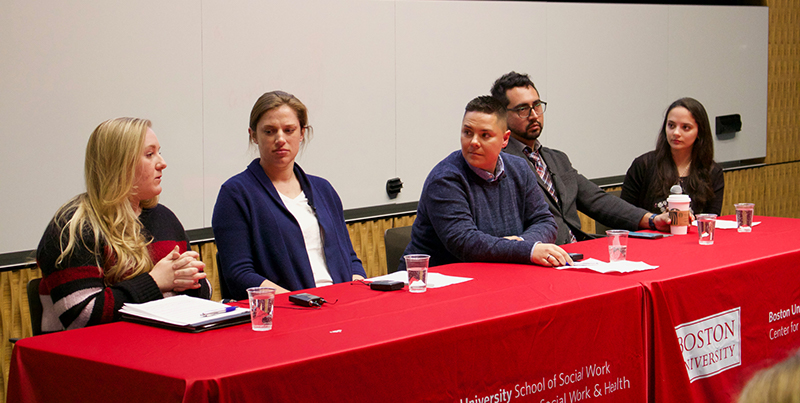Thursday, April 09, 2020

On Tuesday, February 25, 2020, the Center for Innovation in Social Work & Health (CISWH) Social Work and Health Equity Speaker Series hosted a panel discussion called Stopping Sex Trafficking: The Role for Health and Social Services. This panel featured voices from key community perspectives to explore the impact of sex trafficking, how to identify victims, and ways to support survivors in their healing journey.
The panel was moderated by BU School of Social Work graduate student Erin Sheehan, and featured:
- Nikki Valila, Director of Training at My Life My Choice, Justice Resource Institute
- Jennifer Martin, LISCW, Staff Clinician at Project Reach, The Trauma Center, Justice Resource Institute
- Louise Sheehan, RN, Access Nurse at Mass General Hospital Freedom Clinic
- Oscar Delgado, Outreach Coordinator at New England Coalition Against Trafficking
- Madeline Pouw, BU MPH student and Co-Founder of Every Hand is a Hero
Framing up the discussion to follow, Madeline Pouw stressed that sex trafficking is not a “somewhere else” or “somebody else” issue. It happens everywhere, in all 50 states, and over 80% of victims are United States citizens. Many victims are involved in the welfare system and traffickers prey on their vulnerable position, typically recruiting victims online and building trust with seemingly helpful or romantic gestures. All too often, favors turn into debts that trap victims on the wrong end of a power dynamic that seems inescapable.
The discussion then turned to the panel, which examined sex trafficking from social work, health care, social justice, and mental health perspectives, and highlighted challenges and opportunities that could make progress in stopping sex trafficking.
Interdisciplinary solutions to a multi-faceted problem
First, panelists were asked to think about how their organization used cross-agency and professional collaborations to help prevent sex trafficking. Panelists agreed that successful intervention requires a cross-disciplinary approach, involving family, social work, law enforcement, education, and health care systems. For example, MGH’s Freedom Clinic created a trauma-informed specialty provider network to meet the complex and diverse needs of this population. They secured specialized medical billing codes that opened the door to mental health, housing, and unique recovery services such as removal of branding tattoos.
Oscar Delgado noted that a significant challenge is long-term economic development for survivors. Once they leave dysfunctional networks, survivors need skills training as well as transitional assistance to rebuild their lives. Shelters can be traumatic, yet there are few safe housing options. Agencies need to reach across traditional roles and work together for integrative, holistic approaches to supporting survivors.
Creating a roadmap for survivors and providers
There’s no easy or clear path for survivors. Most of the time, victims simultaneously have contact with multiple systems that provide support in a specific area of expertise—but rarely is anyone coordinating the entire effort. The panelists suggested developing a scenario-based playbook like the ones used in medicine (e.g. if a patient’s blood pressure drops, follow these three steps) to think about protocols for treating survivors, including which systems and providers would need immediate, coordinated activation.
Of primary concern, the panelists agreed, is to not re-traumatize victims through a piecemeal system. Nikki Valila of My Life My Choice noted that nearly 90% of victims reported contact with someone who could have helped—but they couldn’t bring themselves to ask. If providers knew what to look for and the right questions to ask, they could provide faster and better assistance. Humanizing the process and dialogue, collaborating across disciplines, and using technology can all be used to build trust with survivors and help guide them forward.
Shared networks expedite connection with resources
Broad networks among service providers create the most opportunities to help survivors access support systems when and where they need them. Panelists called for establishing cross-disciplinary pathways to facilitate access to services, including pro bono legal resources for survivors trafficked as undocumented immigrants. Knowing whom to contact for jobs, housing, legal resources, and food—the foundational supports for rebuilding a life—helps providers move swiftly, so victims aren’t further traumatized by navigating an intimidating system.
Strategies for concerned parents and caregivers
Asked how to prevent recruitment, panelists noted that a good place to start is through conversations at home, with family and friends. Building trust within families and having honest dialogue with safe spaces for questions create an environment where adolescents feel like they belong and are less susceptible to online predators. “We can’t stay ahead of technology,” notes Delgado, “so we need to do a better job of building trust with our families.”
Article by Mariah LeStage, photo by Nilagia McCoy.